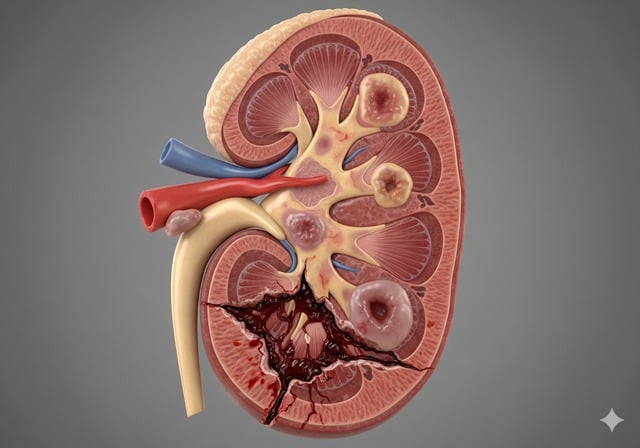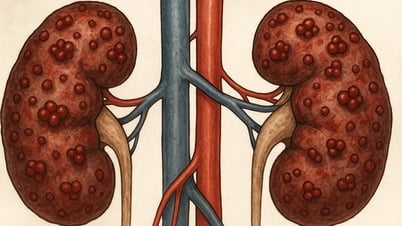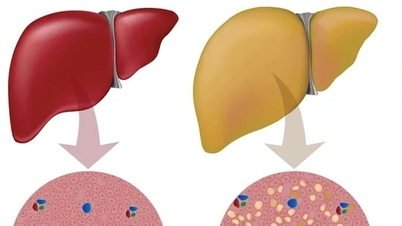Research suggests that recurring nighttime symptoms may be an early warning sign of underlying health problems. The kidneys are particularly vulnerable at night, when bodily functions change, hormones fluctuate, and physical or mental stress becomes more pronounced.
Recognizing these warning signs is important for prompt detection and treatment, which can help prevent serious complications.
Why is night important in detecting health problems?

Since nighttime is a natural stress test for vital organs, including the kidneys, persistent symptoms that occur during sleep should not be ignored.
ILLUSTRATION: AI
At night, the body's systems slow down and certain biological hormones increase and decrease to maintain physiological balance. This change can reveal problems that are not often noticeable during the day.
Since nighttime is a natural stress test for vital organs, including the kidneys, persistent symptoms that appear during sleep should not be ignored.
Nighttime warning signs related to the kidneys
According to research published in the US National Library of Medicine PMC , restless legs syndrome is more common in chronic kidney disease, linked to toxin buildup and sleep disturbances, along with other warning signs like frequent urination and nighttime swelling.
Difficulty sleeping. When the kidneys don't filter properly, toxins stay in the blood instead of being excreted in the urine. This can cause difficulty sleeping. Obesity is also linked to chronic kidney disease, and sleep apnea is more common in people with kidney disease.
Waking up frequently to urinate. One of the most common and earliest signs of kidney disease is nocturia – urinating more than once a night. As kidney function declines, people often go to the bathroom more often at night. Nocturia is closely linked to the progression of chronic kidney disease, according to the Times of India.
Restless Leg Syndrome. Restless leg syndrome, which causes the legs to move at night, is much more common in people with kidney disease. It is related to iron imbalance and the buildup of toxins in the body. The constant urge to move prevents deep, restful sleep, leaving the sufferer exhausted during the day.
Swelling is worse at night. When the kidneys are not functioning properly, fluid builds up in the tissues, often causing swelling in the ankles, legs, or feet. This swelling may worsen at night or cause a feeling of heaviness and discomfort. Studies also show that nighttime swelling may be associated with a combination of heart and kidney dysfunction, known as cardiorenal syndrome.
If these symptoms occur repeatedly at night, they may be your body's way of signaling kidney problems. Seeking medical attention early can help uncover the underlying cause, leading to prompt treatment and improved quality of life. Paying attention to what happens at night may be the key to protecting your long-term health.
Preventive tips for healthy kidneys
Maintaining healthy kidneys is essential for overall health. Simple lifestyle changes such as a balanced diet, regular exercise, adequate hydration, and avoiding harmful habits can protect these vital organs. Early prevention and regular health checks can reduce the risk of chronic kidney disease, ensuring long-term health and vitality.
Preventive measures for healthy kidneys are:
- Stay hydrated by drinking enough water during the day.
- Limit salt and processed foods.
- Avoid overuse of pain relievers and over-the-counter medications.
- Control blood pressure and blood sugar.
- Monitor kidney function by getting regular health check-ups, according to Times of India.
Source: https://thanhnien.vn/4-trieu-chung-ban-dem-tiet-lo-than-yeu-cho-bo-qua-185251005045249023.htm




![[Photo] Prime Minister Pham Minh Chinh chairs the Government's online conference with localities](https://vphoto.vietnam.vn/thumb/1200x675/vietnam/resource/IMAGE/2025/10/5/264793cfb4404c63a701d235ff43e1bd)
![[Photo] Prime Minister Pham Minh Chinh launched a peak emulation campaign to achieve achievements in celebration of the 14th National Party Congress](https://vphoto.vietnam.vn/thumb/1200x675/vietnam/resource/IMAGE/2025/10/5/8869ec5cdbc740f58fbf2ae73f065076)

















































![[VIDEO] Summary of Petrovietnam's 50th Anniversary Ceremony](https://vphoto.vietnam.vn/thumb/402x226/vietnam/resource/IMAGE/2025/10/4/abe133bdb8114793a16d4fe3e5bd0f12)

![[VIDEO] GENERAL SECRETARY TO LAM AWARDS PETROVIETNAM 8 GOLDEN WORDS: "PIONEER - EXCELLENT - SUSTAINABLE - GLOBAL"](https://vphoto.vietnam.vn/thumb/402x226/vietnam/resource/IMAGE/2025/7/23/c2fdb48863e846cfa9fb8e6ea9cf44e7)


































Comment (0)